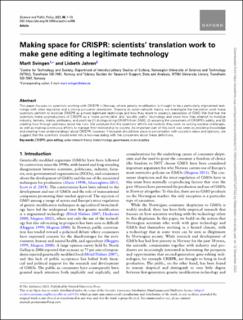Making space for CRISPR: scientists’ translation work to make gene editing a legitimate technology
Journal article, Peer reviewed
Published version
Permanent lenke
https://hdl.handle.net/11250/3114315Utgivelsesdato
2023Metadata
Vis full innførselSamlinger
Originalversjon
10.1093/scipol/scad050Sammendrag
This paper focuses on scientists working with CRISPR in Norway, where genetic modification is thought to be a particularly stigmatized technology with strict regulation and a strong consumer skepticism. Drawing on actor–network theory, we investigate the translation work these scientists perform to mobilize CRISPR as a more legitimate technology and how they relate to society’s perception of GMO. We find that the scientists make co-productions of CRISPR as a ‘more controllable’ and ‘socially useful’ technology and show how they attempt to mobilize industry, farmers, media, politicians, and youth by (1) distinguishing CRISPR from GMO, (2) assuring the consumers of CRISPR’s safety, and (3) creating trust through openness about the risks. We conclude that the scientists’ efforts are twofold; they work on solving societal challenges, as well as making continuous efforts to manage their relationship to society. An important part of this work was seen as providing knowledge and creating ‘new understandings’ about CRISPR; however, if research should take place in conversation with society’s views and opinions, we suggest that the scientists should enter into a two-way dialog with the consumers about these definitions.

